What Would Make People Pay For Your Virtual Event Ticket?

Share
People are precious with their pennies when it comes to paying for something like an event.
Especially so when it’s completely online.
So, what would really make someone pay for a virtual event ticket? We asked and got you some answers. Here are the top 8 things your audience would pay for…

1. Targeted Workshops and Courses
The ability to learn a new skill is by far the number one reason we found that people would pay for an online event.
Who doesn’t love a good workshop? Providing insightful knowledge and a training experience that your audience would otherwise have to learn themselves (or pay elsewhere to do so) is a sure way to get them digging deep in their pockets.

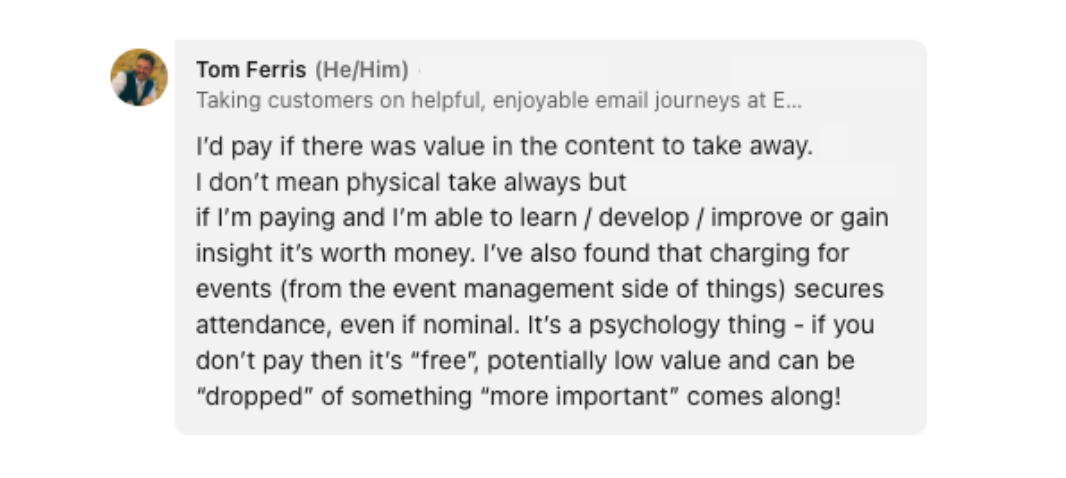
A learning opportunity like this is also a good way to reduce your no shows. Sure, there will be some people that may not attend live, which is why on-demand material is still super important (we cover more on this below).
But you have a better chance of people showing up live if it’s an interactive course, providing you with a bigger pool of attendees to engage with during your event.
Positioning your event the right way is also vital.
First, think about what you’re going to call it. A ‘webinar’ or’ online event’ is okay, but if you’re running something that provides an end goal, words like ‘workshop,’ ‘course’ or ‘bootcamp’ will resonate better with your audience:
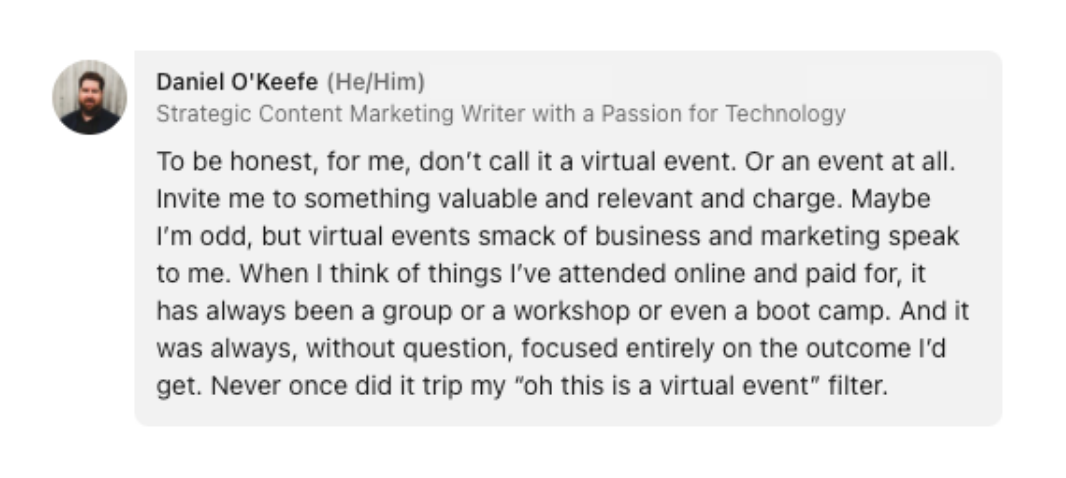
Next, clearly define the value your event is going to add and the specific deliverables your attendees can expect to walk away with.
Melanie Deziel, Director of Content at Foundation Marketing, explains how important it is to be specific with this on our video series, Unmuted:
Whatever you do, please don’t also forget about after the event and what you can do in the follow up.
Sending over recordings and additional content like re-cap documents or reminder instructions will keep you in your attendee’s good books for sure:


2. New & Exclusive Content
That leads us nicely onto the second most popular reason people would pay for a virtual event ticket, exclusive content.
Two words; don’t sell.
The last thing your audience wants is a sales pitch or link to a video that’s readily available on your YouTube. If they’re paying for the privilege to access your event, they are there to see something new.
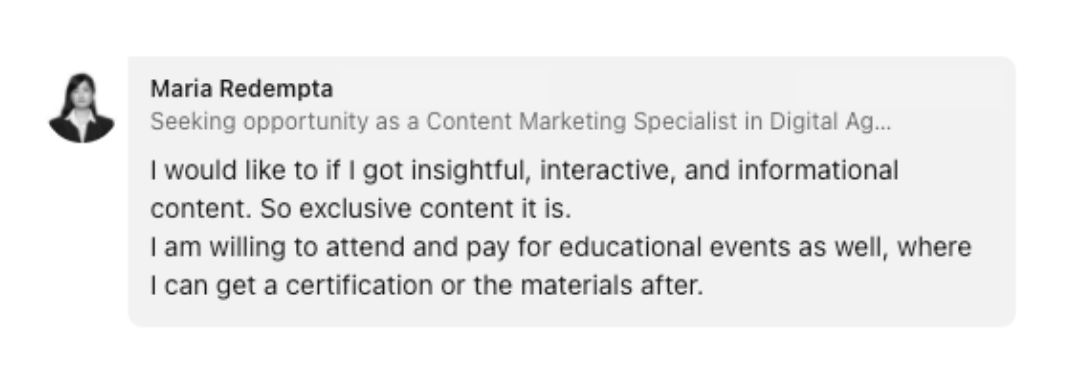
Never-before-seen downloadable templates, new research data and exclusive how-to videos are all great ways you can share this type of event content. And as we’ve already discovered, educational content will get people fighting for a ticket.
But let’s also think about other types of content you could work in during your event. Do you have an awesome speaker line up? Involve them with your audience!
Dedicated Q&As or breakout sessions with speakers are priceless opportunities for your audience and are a sure fire way to get them to hand over those pennies.
And of course, if you’re using a virtual event platform that can house these types of interactive features then you’re already on your way to a winning event. The last thing your audience are going to want to see is yet another Zoom call if they’re paying for it.
3. Special Incentives
Here’s the deal; you would expect to receive something after coughing up your hard earned money, so why would your attendees be any different?
Think about some extra incentives or special gifts you could give your audience for attending.
Going back to an exclusive workshop or course, what about providing something like a certificate after the event? This adds a nice little extra and gives your course a bit more gravitas. It’s also something your audience could share online, giving your event and brand a little social boost.
Other nice incentives could be a book or a free trial to your software. Cool ‘swag bags’ have also been a popular hit with paying attendees:

Have a think about something out of the box you could do, that’s also relevant to your target audience and event topic. Here’s a nice example that resulted in sold out tickets within 3 days:
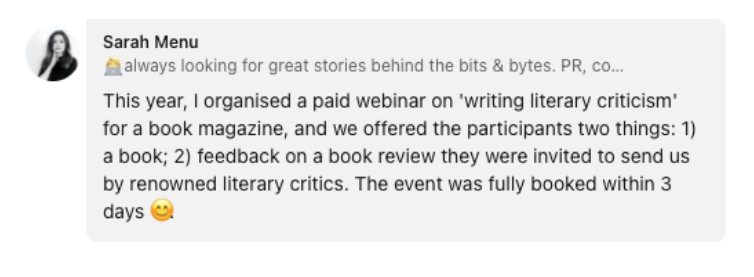
4. Discounts
You knew it was coming; the dreaded ‘d’ word. But we do all love a good discount, and nothing makes someone hit that purchase button quicker than a limited offer.
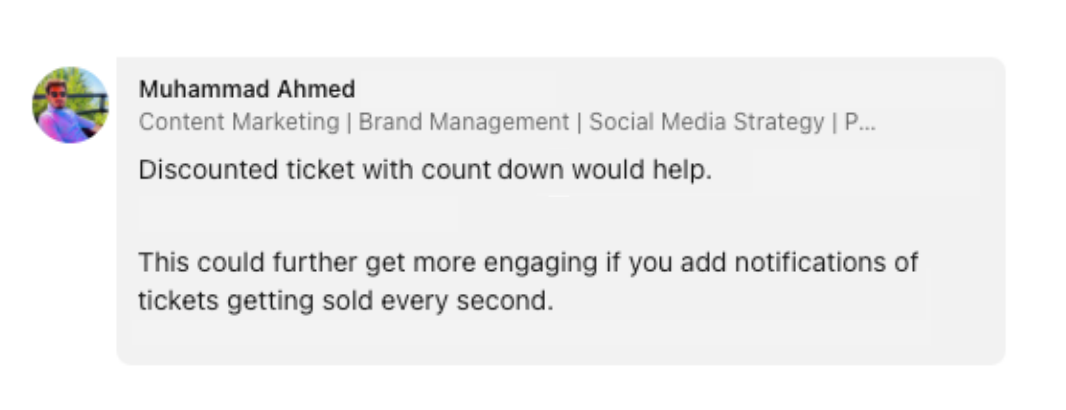
Try adding some urgency on your registration page with a countdown to how long discounted tickets are available, or a notification showing how many tickets are left.
How about offering a discount on future events, or a free pass to the next one? Create an offer your audience absolutely can’t say no to.
5. Quality & Diverse Speakers
It goes without saying how important diversity and inclusion is in all aspects of your event. People want to see real representation, and your attendees are no different.
In fact, a diverse and inclusive speaker line-up is something your audience expects to see, especially when they’re paying for a ticket. So you better step up.
Don’t just go with the same line-up that every other event in your industry has. It may be easier that way, but you’re doing your event and your attendees a disservice.

Choose a panel beyond your industry and regular speakers. People who will truly resonate with your target audience, that your attendees may not have heard from before, people that have something new to say.
That way you have an awesome selling point, provide true value to your audience and have a niche against other competitor events. Win!
And that’s not all.
Diversifying your speaker line-up can actually increase your audience size.
Rand Fishkin, CEO of SparkToro talks all about the benefits event organisers can reap with a more inclusive line-up on Unmuted:
He goes on to explain how your ticket sales can go up with more respresentation:
“You have the opportunity to sell more tickets, you’ll get higher speaker ratings, you’ll attract reviews, you’ll get a new audience that you didn’t reach before. Demand goes up, it’s just a win win.”

6. Content Beyond the Event
We’ve talked a little about what you can do when your event is over, but there’s so much more value you could add to your follow up and on-demand content. And let’s face it; many people still don’t do enough.
Another trending topic in our feedback is providing content beyond the event. As your audience is paying for a ticket, the likelihood is they’ll show up, especially if it’s an interactive workshop or course.
However, don’t forget about those that perhaps have to cancel at the last minute or want to re-watch later down the line. Making your virtual event available to watch on-demand gives you further opportunity to engage your audience long after the event has finished.

But that’s just the beginning.
If you really want to step up your game (and you should because you’re charging), send attendees additional content after the event. Why not even revamp your event pages to make an on-demand content hub?
You could send further learning materials to keep their interest going. Better yet, if you’re using a virtual event platform that can gather the right insight, use this data to really target what to send your attendees.
Find out what content they interacted with most during your event and send them a nice personal follow up message with further content around this.
Did you notice we used the word ‘personal?’ That’s right.
Personal follow ups really do work, so try not to automate this stage.
Dean Seddon, CEO of Maverrik’s event attendee rates have soared using this tactic:
And there’s even more.
We’ve talked about hosting Q&A sessions and breakout rooms with speakers during the event to get people attending, but you could go even further and host additional, smaller sessions after the event.
There’s so much you can do in your event follow up to keep your paying attendees happy, why not read our guide on driving effective follow up campaigns?

7. Good Networking Opportunities
Networking opportunities are also a very popular reason people would pay for an online event.
Keep your event interactive with event engagement features like chat rooms, matchmaking apps and dedicated breakout sessions to connect your attendees with prospects or other people in the industry.
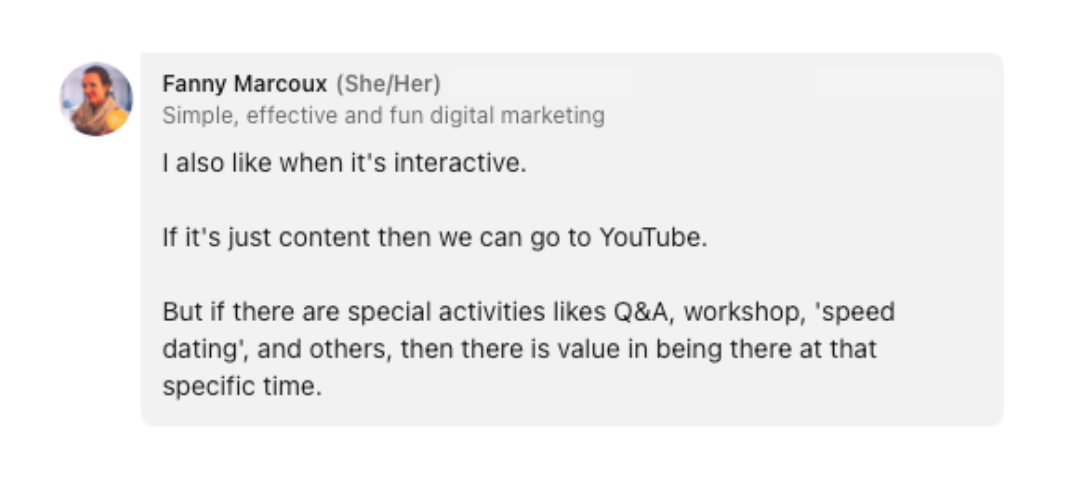
These give your attendees the ability to build one-on-one connections with other like-minded people – something that will be priceless to your audience.
And here’s another thing; forming a real sense of community during your online events will get your audience coming back for more.

Why not carry this on after the event and create an exclusive online community via something like a LinkedIn, Facebook or Slack group?
This is something that’s worked extremely well for Joe Glover, Founder of The Marketing Meetup. So much so that he uses this type of feedback to measure the success of his online events:
8. Charitable Cause
Last but certainly not least, is giving proceeds to charity. Of course, it goes without saying that this is a great thing to do ethically. However, it can also give your audience that extra little push to purchase if they know it’s going towards a good cause.
And you know what else? Adding a charitable element can also act as a great incentive for those involved to work even harder at your event.
Here’s a stellar example…
The guys over at Terminus introduced some healthy competition between speakers at their event, Break Sh!t. Each speaker was given just a 14 minute time slot with live audience feedback. The speaker that came out top won $10,000 to donate to a charity of their choice.
Winning speaker and Founder of Be the Keynote, Oli Gardner, recounts just how well this incentive worked to push speaker boundaries:
“It really helped everybody do a better job, just doing that little extra incentive… If you’re putting on an event, find ways to incentivise the speakers going above and beyond, or doing something a bit differently.”
Summary
To summarise, if you focus on;
Providing fire and preferably educational content during AND after your event
Showcasing an exclusive space for attendees network with one another as well as with speakers
Diversifying your speaker line up and thinking outside the box
Positioning your event so that the value you’re adding is clear from the get go
Then you will be well on your way to creating an online event attendees would love to pay for.
Ready to start planning your event but need to think about how you’re going to effectively measure it? Here are 16 vital KPIs to help you measure your online event sucsess.
Inspired for your next online event?
See the streamGo platform in action!




